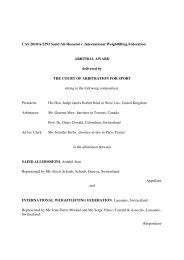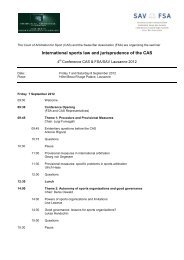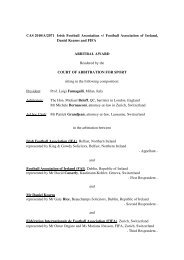(CAS) Bulletin - Tribunal Arbitral du Sport / TAS
(CAS) Bulletin - Tribunal Arbitral du Sport / TAS
(CAS) Bulletin - Tribunal Arbitral du Sport / TAS
Create successful ePaper yourself
Turn your PDF publications into a flip-book with our unique Google optimized e-Paper software.
another players’ agent (…) operating under the auspices of<br />
the Association [IFA] and which concerns their activities as<br />
players’ agents shall be referred to the Arbitration Institute for<br />
resolution. (…) ”.<br />
“ 14.2 The obligation to refer the dispute to arbitration is<br />
mandatory, and arbitration proceedings shall be con<strong>du</strong>cted in<br />
accordance with all the provisions contained in the Arbitration<br />
Institute’s articles ”.<br />
“ 14.3 Any disagreement or dispute as stated in paragraph 14.1<br />
above concerning an international transfer, shall be adjudicated<br />
by FIFA’s Player’s Status Institute, unless all the parties to<br />
the dispute or disagreement are registered with and/or operate<br />
under the auspices of the Association [IFA], in which case the<br />
matter shall be referred to the [IFA] Arbitration Institute for<br />
determination ”.<br />
The above provisions clearly set forth an arbitration<br />
clause in favour of the IFA Arbitration Institute<br />
when all the parties are registered with the IFA.<br />
As already stated, it is undisputed that at the time<br />
of the dispute both the Player and the Agent were<br />
registered with the IFA. As another <strong>CAS</strong> panel has<br />
clearly stated, when an indivi<strong>du</strong>al such as a player or<br />
an agent registers with a national federation “by his<br />
deliberate act of registering, he has contractually agreed to abide<br />
by the statutes and regulations of the [national federation]”<br />
thus pledging to comply with an arbitration clause<br />
included therein (<strong>CAS</strong> 2007/A/1370-1376, para.<br />
91). This is in line with the established case law of<br />
the Swiss Federal <strong>Tribunal</strong>, which has considered<br />
the arbitration clauses contained in the statutes of<br />
sports associations to be valid (see e.g. Judgment of<br />
9 January 2009, 4A_460/2008, para. 6.2, and the<br />
previous jurisprudence quoted therein).<br />
Accordingly, the Panel fi nds that both the Appellant<br />
and the Respondent were contractually bound to<br />
arbitrate their dispute before the IFA Arbitrator<br />
appointed in accordance with the rules of the IFA<br />
Arbitration Institute. In other words, the Panel<br />
fi nds that the IFA Arbitrator did have jurisdiction to<br />
entertain the said dispute and adjudicate the parties’<br />
claims. The Panel is comforted in this fi nding by the<br />
fact that both the District Court of Tel Aviv-Jaffa and<br />
the Israeli Supreme Court expressly held that the IFA<br />
Arbitrator lawfully retained his jurisdiction.<br />
The Panel notes that the Appellant also argued that<br />
jurisdiction could not be conferred by the parties<br />
upon the IFA Arbitration Institute because the IFA<br />
Arbitrator’s award could not enjoy the enforcement<br />
mechanism provided by FIFA. The Panel cannot<br />
concur with this argument. First, concerns about the<br />
possibility to enforce a decision do not change the<br />
substance of the provisions which confer jurisdiction.<br />
Second, the IFA Arbitrator’s award, being a normal<br />
arbitral award, is easily enforceable (like any<br />
commercial arbitral award) in any country which is<br />
a party to the New York Convention. Finally, given<br />
that the IFA Arbitration Institute’s jurisdiction is<br />
recognized by FIFA rules, it is possible that FIFA<br />
would provide its mechanisms in aid of enforcement<br />
if so requested.<br />
In conclusion, the Appellant’s submission that the<br />
award is not recognizable in Switzerland because the<br />
IFA Arbitrator had no jurisdiction fails.<br />
D. Possible recognition under Article V, para. 1,<br />
of the New York Convention<br />
Article V, para. 1, of the New York Convention reads<br />
as follows:<br />
“ 1. Recognition and enforcement of the award may be refused,<br />
at the request of the party against whom it is invoked,<br />
only if that party furnishes to the competent authority<br />
where the recognition and enforcement is sought, proof<br />
that:<br />
(a) The parties to the agreement referred to in article II<br />
were, under the law applicable to them, under some<br />
incapacity, or the said agreement is not valid under<br />
the law to which the parties have subjected it or,<br />
failing any indication thereon, under the law of the<br />
country where the award was made; or<br />
(b) The party against whom the award is invoked was<br />
not given proper notice of the appointment of the<br />
arbitrator or of the arbitration proceedings or was<br />
otherwise unable to present his case; or<br />
(c) The award deals with a difference not contemplated<br />
by or not falling within the terms of the submission<br />
to arbitration, or it contains decisions on matters<br />
beyond the scope of the submission to arbitration,<br />
provided that, if the decisions on matters submitted<br />
to arbitration can be separated from those not so<br />
submitted, that part of the award which contains<br />
decisions on matters submitted to arbitration may<br />
be recognized and enforced; or<br />
(d) The composition of the arbitral authority or the<br />
arbitral proce<strong>du</strong>re was not in accordance with the<br />
agreement of the parties, or, failing such agreement,<br />
was not in accordance with the law of the country<br />
where the arbitration took place; or<br />
(e) The award has not yet become binding on the parties,<br />
or has been set aside or suspended by a competent<br />
authority of the country in which, or under the law<br />
of which, that award was made ”.<br />
Jurisprudence majeure / Leading cases<br />
-<br />
72





